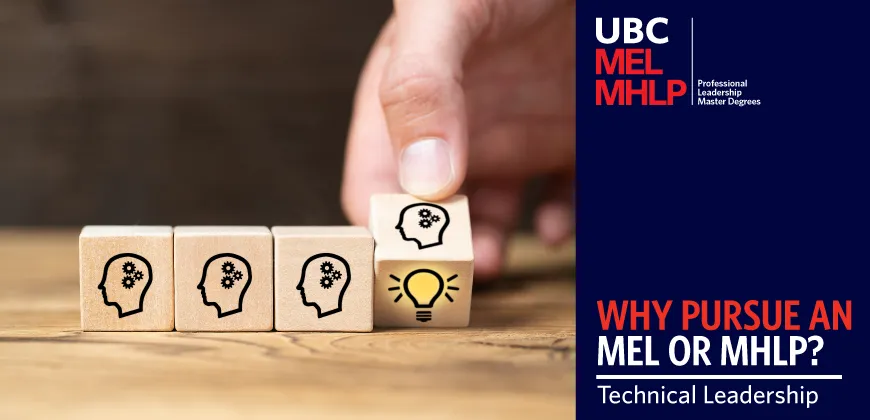Becoming a leader

With “leadership” embedded in the very name of the degrees, the Master of Engineering Leadership and Master of Health Leadership and Policy were designed from the beginning to support leadership development.
But what does it mean to be a leader? What are the defining attributes of effective leaders? And how do you develop these skills?
There are many models of leadership, and leadership can look quite different from one organizational structure to the next. However, there are some common qualities shared by effective and respected leaders – qualities that are developed by the MEL and MHLP programs.
Developing expertise in your field
When we asked the directors and instructors in the programs to define the attributes of a good leader, they spoke of the need for technical expertise combined with strong knowledge of related disciplines. This balance supports a systems-thinking approach and enables leaders to evaluate and propose solutions that can succeed, whether that’s coming up with new materials and processes for the manufacturing industry or an innovative program to improve the lives of seniors in care.
Students in the MEL and MHLP deepen their technical expertise through cross-disciplinary courses that provide a broad understanding of the latest industry sector advances.
The programs also offer electives, capstones, practicums and industry-driven projects that create opportunities to deepen technical expertise in a specific area.
Strengthening your non-technical skills
While program directors and instructors emphasized the importance of technical knowledge, they also spoke about self-awareness, creativity and strong communication skills as essential to effective leadership.
As Jordi Honey-Rosés, an instructor in the MEL in Urban Systems, says: “Good leaders are aware of their own potential biases and the biases of the people around them. They are able to ask good questions and surround themselves with strong teams who bring skills, perspectives and diversity that they lack. Good leaders are forward thinking, can anticipate future changes – technological or social – and can inspire others to work for common goals.”
But how do you deepen your self-awareness, become a better communicator and gain the confidence to lead as an inspiring innovator?
The structure of the MEL and MHLP supports this growth, with (depending on the program) anywhere between 30 and 50 per cent of a program’s curriculum focusing on business, strategy and leadership development in courses taught through UBC Sauder’s Robert H. Lee Graduate School. Students say that these courses inspire them to think about leadership in new ways, and to continually assess their own strengths and areas for improvement.
Reflecting on her experience as a student in the Dependable Software Systems program in 2020, Namratha Rao says, “These classes increased my level of self-awareness, teaching me how to make effective, unaided intuitive decisions and recognize my limits, helping me build on my strengths in critical decision-making.”
Innovation and creativity are essential to effective leadership
Lillian Hung, an instructor in Seniors Care, says that leaders need to be “skilful in inspiration and visionary thinking,” and Amanda Giang, an instructor in Clean Energy Engineering, says effective leaders need “boldness, innovativeness and creativity.”
Both the technical and business/leadership classes of the MEL and MHLP are designed to develop the ability to think critically and creatively. Through cross-disciplinary courses, case studies and collaborative work with classmates from a diverse range of professional and personal backgrounds, students are immersed in a learning environment that promotes new perspectives and an openness to innovative approaches.
Finally, leaders must have strong interpersonal and communication skills and the ability, as Amanda Giang says, “to communicate effectively to different audiences.”
Leaders need to be able to clearly communicate technical issues to a broad range of stakeholders, who can include technical professionals in their field, but also professionals in other disciplines, financial and business leaders in their organization, government representatives and the public. The MEL and MHLP offer ample opportunities to develop written and verbal communication skills, through writing assignments, solo and group presentations, working within multidisciplinary groups, networking events and extracurricular activities.
Practice, practice, practice
MEL and MHLP students say the in-class discussions and group projects are great ways to practice the new styles of communication, collaboration and project management they are learning.
As Sean Mercer, a 2020 grad in Integrated Water Management says, “It can be as simple as taking something from one course about leadership styles and then applying those ideas when running group meetings. The MEL is a time away from work where you’re meeting so many new people and being exposed to many new ideas. It’s a great opportunity to experiment with these new ideas and then take the lessons and skills you’ve learned into whatever is next for you.”
Every class – whether it’s offered through the Faculty of Applied Science or UBC Sauder’s Robert H. Lee Graduate School – asks students to consider what leadership looks like within their sector and to then develop and practice the skills they will need to excel and drive change in their organization as confident and effective leaders. With their combination of technical and business education, the MEL and MHLP programs are uniquely tailored for today’s professionals. To learn more about how these degrees can help you develop the integrated perspective to accelerate your career, see our articles Technical expertise is fundamental to leadership, Speaking the language of business is fundamental to leadership and Today’s leaders need integrated perspectives.


